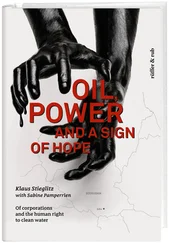— I realized how lonely I had been all this while. What we had, me and James, couldn’t really be called a marriage. At first we used to phone every day, but then many days would pass without a word from him. He always claimed that the infrastructure in Nigeria was just awful. Well, I had a brilliant idea. I was going to have a baby. I was going to go to Nigeria on a surprise visit, get pregnant, and everything would be fine.
At first he appeared happy to see her, and every day he came home early from work; there were invitations from other families for cocktails and garden parties, and trips to Lagos and Abuja — in the evenings they’d sit out on the veranda, with its view of the distant sea, and eat, refreshed by the sea breeze. But then, abruptly, things changed. A bomb exploded at his office, and the next day an Italian worker was kidnapped. He started coming home late, saying things were crazy at the office, and he had to be there all the time. After a month of waiting for things to change, of going to the club to play tennis with some of the wives, of sipping sherry under umbrellas by the pool, alone, she realized that was it, and things were not going to change.
— When, in desperation, I told him about my intention to get pregnant, he said it was out of the question. And that was when he told me he was seeing someone else. He didn’t tell me whom, and I assumed it was one of the many expatriate women I always saw at the club. He told me he wanted a divorce.
I kept nodding, keeping my expression pleasant and interested, comparing what she was telling me with what her husband had told me. I tried to calm my excitement: I was being handed a major scoop, and, though I had no pen or recorder, I was storing every word, every inflection of her voice.
— Well, he said the affair had been going on for a while, and. . and that she was pregnant. You can imagine how I felt, the shock. It was as if a cloud had risen in the room, roaring and blocking out every other thing. I couldn’t see. I needed to be alone, to think. It was late at night and I didn’t know the roads very well. The driver, Salomon, always took me out, but I didn’t care. I took the car and went to the club. My plan was to leave for London the next morning.
But she was surprised to find that Salomon had come to look for her there. At first she thought he was waiting to drive her home, but then she noticed he wasn’t wearing his blue-and-black uniform.
— Hello, Solomon. .
— Salomon.
She realized she had always referred to him as Solomon, and he had never corrected her, till now.
— Oh, sorry.
— It’s okay. No problem.
— Did James send you?
— No, madam. I came to talk to you about something serious.
He looked and sounded different. He was wearing a jacket — a bit tight around the shoulders — and it gave him a more formal air than the uniform ever did; and he wasn’t speaking the usual pidgin English that she found so irksome and that always had to be explained to her. Today he spoke a grammatically faultless English, and even the accent was modified, easy to understand. Later she discovered that he was actually a university graduate who, like a lot of young men in the Delta, had been forced to take a job far below his qualifications while he waited for that elusive office job with an oil company. She gave him the car keys and they drove — she had no idea where they were going, but she didn’t care. Something told her what she was about to hear wasn’t going to be pleasant. He said nothing as he drove but she could feel him watching her in the car mirror. Finally they stopped at what looked like a roadside motel.
— Can I get a drink here?
— Yes. My uncle owns this place.
— Good. I’ll have a whiskey.
He led her into a deserted bar, and they sat in a dark corner. The bartender glanced briefly at them and returned to reading his magazine. Salomon went to the bar and returned with her drink.
— Thanks. Aren’t you having anything?
— No, madam. I’m fine.
— Okay, what is it?
— It’s about Koko.
— Koko? What about Koko?
Koko was the maid. She cooked and cleaned three days a week.
— Koko is my fiancée. Yesterday she told me she was pregnant.
He looked mournful, uncomfortable. He sat stiffly on the edge of his seat, and he avoided her eyes as he spoke.
— Well, Salomon, congratulations, but I’m in no mood to celebrate—
— No, not by me. She is pregnant by the Oga.
She didn’t feel anger or sadness; she had already exhausted that emotion the night before. She only felt surprised that she had been unable to detect what was going on, right under her nose, and she felt sadness, not for herself but for Salomon.
— Do you love her?
He nodded, the bitterness now plain on his face, making his mouth twist at the side and his eyes turn red and teary.
— I love her.
— I’m sorry.
— It is not fair. How can Oga do this to me? I respected him. I trusted him, and see what he did to me. Why? I want to know why, can you please tell me?
— And, suddenly, I didn’t feel like seeing James again. I didn’t want to go home; I couldn’t. I told Salomon to take me to any good hotel, and he suggested I stay there, at his uncle’s motel.
— And you weren’t scared of staying there? You trusted Salomon that much?
— I guess I did. I had known him for over six months by then, and. . it was a good motel, really. It was quite clean, but, most important, it was the last place James would come looking for me.
— But why didn’t you go back to the club?
— Because that was the first place James would come looking for me. And I didn’t want to see them, my fellow expatriates, with their phony smiles, laughing at me behind my back. I just wanted to be alone. . I gave Salomon a note for James. I told him to give Salomon my things, that I was leaving the next day, that I would call him when I got to London. And—
She was interrupted by a hand parting a slit in the tent’s entrance and a face peeping in — it was the young girl, Alali, and she entered with a single item of clothing held gingerly in her hand. Isabel took it — it was a blouse — and put it beside her on the mat. She smiled up at the girl, who smiled back and skipped out of the tent.
I waited for her to resume where she’d stopped, and as I waited my nervousness returned. She had told me a great deal, but there was still a lot more to tell, and what if she didn’t want to go on — how should I persuade her to finish the story? So far all I had was one half of a story. What would I do with it if I didn’t get the other half? She closed her eyes and held one palm to her forehead — she wasn’t well, it was obvious.
— Mrs. Floode. . are you all right? Do you need a rest? We can continue later. .
She nodded gratefully.
— Yes, please. I have a crushing headache. .
I left. It was a long way to Port Harcourt and I was sure there’d be another opportunity to finish the interview. Besides, I was also feeling tired. The initial burst of energy I’d felt when she granted me the interview was dissipating. I met the girl outside and she took me to Tamuno and Michael. They were by the water, stripped to the waist, working on a boat, patching holes with tar and scraping mud from the bottom. Other men were equally busy getting their boats ready for departure. The old man took my hand and pumped it energetically. The boy wrapped his arms around my waist and for a moment I was reminded of how he had done the same to Zaq when Zaq agreed to take him back to Port Harcourt. Now I wondered if that promise would ever be kept.
— But where Oga Zaq? You come alone?
I sat next to them and told them about Irikefe, about the fallen statues and the burned houses, about the injured worshippers held more or less as prisoners by the occupying soldiers. They worked as I talked, and the water in the river flowed, and the men came and went, calling out to each other, and for a moment I believed that my adventure was over and that by this time tomorrow I’d be in Port Harcourt, perhaps writing my story, safe, and wiser from my experiences.
Читать дальше












